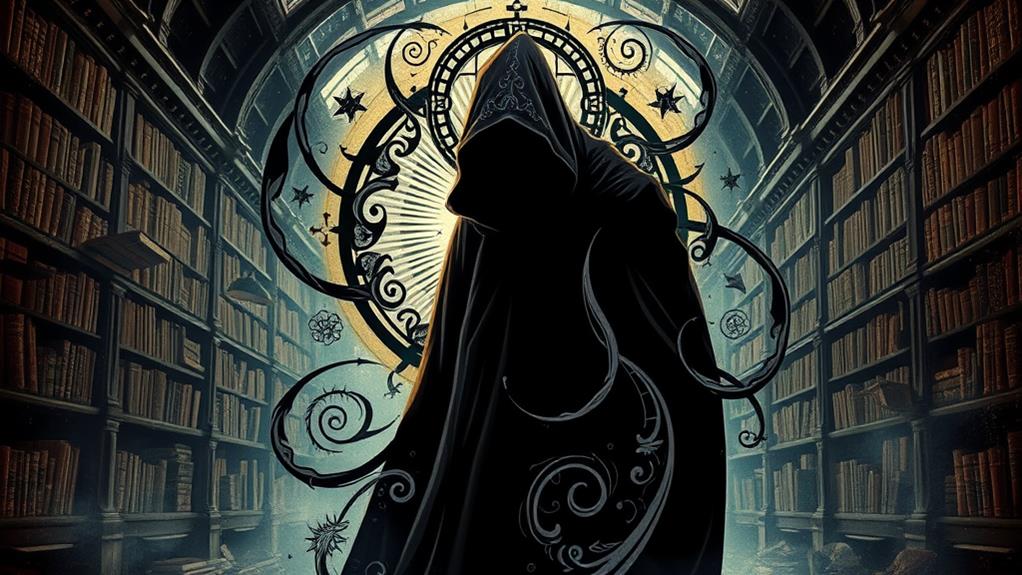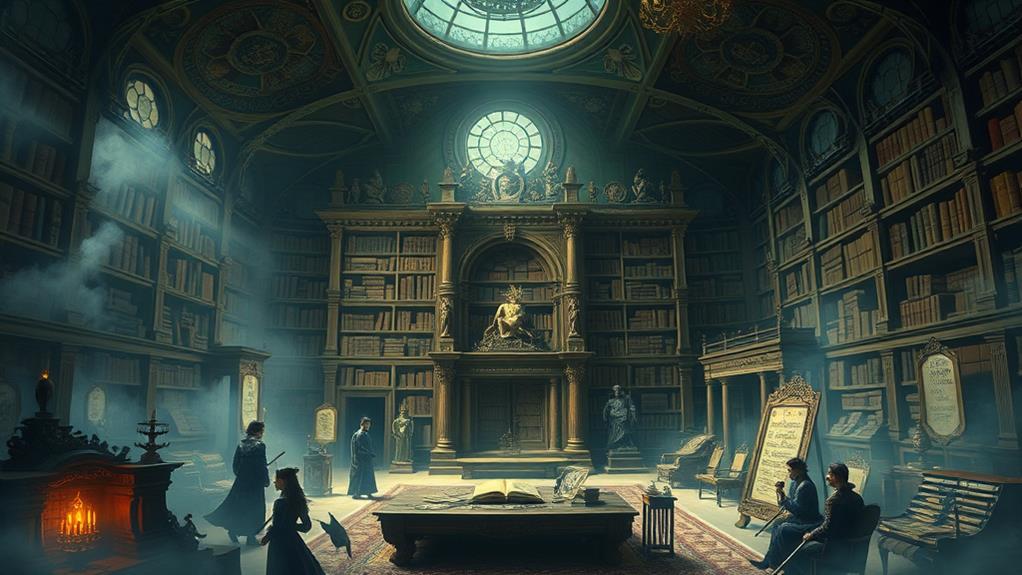In *The Magus*, you follow Nicholas Urfe as he sets out on a journey of self-discovery on the island of Phraxos. Here, he encounters the enigmatic Conchis, who orchestrates a psychological labyrinth that tests Nicholas's perception of reality and identity. Themes of love, betrayal, and existential questioning punctuate his journey, and characters like the alluring Lily complicate his emotional landscape. The narrative's complexity engages you, challenging your understanding of truth and illusion. As you uncover Nicholas's struggles, you'll find that his path leads to profound revelations about your own identity and experiences.
Overview of The Magus
What drives a young teacher to seek adventure and self-discovery on a secluded Greek island? In "The Magus," you meet Nicholas Urfe, a character whose quest for meaning leads him to the fictional island of Phraxos. This postmodern novel, published by John Fowles in 1965, intricately weaves a narrative that challenges your perceptions of reality and identity.
The themes presented in the novel echo the transformative wisdom found in teachings like the Four Agreements, emphasizing the importance of self-awareness and open communication in one's journey of self-discovery.
Nicholas's journey unfolds as he encounters the enigmatic Maurice Conchis, who masterminds a psychological game that pulls Nicholas into a world of bizarre experiences. The story's complexity lies in its unreliable narration and nonlinear timelines, typical of postmodern literature.
As you explore deeper, you see how Conchis manipulates Nicholas's understanding of truth, forcing him to confront his own beliefs and desires.
"The Magus" isn't just a tale of adventure; it's a profound exploration of existential themes that resonate with your own search for meaning. With its psychological depth, the novel invites you to question fixed truths, making it a significant work that continues to spark discussions about the nature of reality and the human condition.
Plot Summary
In "The Magus," you follow Nicholas Urfe as he initiates a journey of self-discovery on the island of Phraxos.
The themes of identity and social class resonate throughout the narrative, echoing the complexities found in classic literature like the destructive nature of bitterness.
Conchis's psychological manipulation challenges your understanding of reality, pulling you into a web of intrigue and emotional conflict.
As you witness Nicholas's struggles, you can't help but reflect on the nature of identity and the impact of betrayal.
Nicholas's Journey of Discovery
Nicholas Urfe sets out on a transformative journey after accepting a teaching position on the Greek island of Phraxos, hoping to escape his disillusionment. Initially, he seeks adventure but soon finds himself feeling unfulfilled and questioning his life choices.
His encounter with the enigmatic Maurice Conchis pulls him into a psychological game that challenges everything he believes about reality and his self-identity.
As you explore deeper into this world, you become captivated by the mysterious figure of Lily, who complicates your understanding of love and desire. Conchis's presence looms large, orchestrating experiences that force you to confront your own motivations and feelings.
The more you learn about Conchis, the more you realize that this journey isn't just about external exploration but about profound self-discovery.
However, the psychological experiment leads to emotional turmoil, shaking your perceptions of manipulation and betrayal.
Ultimately, Nicholas's journey culminates in a return to England, where you grapple with the consequences of your experiences on Phraxos and the unresolved feelings you harbor for Alison.
This journey leaves you forever changed, questioning who you truly are in the wake of newfound revelations.
Conchis's Psychological Manipulation
As you immerse yourself in the complexities of Conchis's world, his psychological manipulation becomes increasingly apparent. Maurice Conchis orchestrates an intricate experiment on Nicholas Urfe, steering his perceptions and emotions through elaborate games and encounters.
The masked panel, a group of characters wearing animal masks, heightens Nicholas's sense of entrapment and confusion, symbolizing authority and complicity in the manipulation.
In this twisted reality, Conchis introduces a "waiting room," a space designed for psychological humiliation. Here, you witness Nicholas grappling with betrayal and vulnerability, feeling the weight of his own choices.
Conchis's storytelling blurs the lines between reality and illusion, challenging Nicholas's understanding of truth and forcing you to question what's real.
As the narrative unfolds, the culmination of Conchis's manipulation compels Nicholas to confront his own identity. This journey leads him to a profound moment of self-realization, where he navigates the consequences of the psychological games played on him.
Ultimately, you see how Conchis's masterful manipulation not only distorts Nicholas's perception but also invites him to explore the depths of his own character and choices.
Character Analysis

While grappling with his self-centered nature, Nicholas Urfe sets out on a profound psychological journey that forces you to question not only his reality but also his identity.
Nicholas is portrayed as a young man caught in a web of self-doubt and emotional detachment, akin to the themes of duality explored in the story of the scapegoat's burden. His interactions with Maurice Conchis reveal layers of manipulation, as Conchis embodies a puppet master, orchestrating psychological games that challenge Nicholas's understanding of control and autonomy.
Lily, initially perceived as a ghostly figure, adds complexity to Nicholas's emotional landscape. As a British actress entwined in Conchis's schemes, she symbolizes the allure of desire and the entanglement of human relationships.
Through her, you see Nicholas's struggle with intimacy and commitment, as he oscillates between longing and fear of vulnerability.
In contrast, Alison Kelly, the Australian air hostess, reflects Nicholas's conflicts and betrayals, showcasing his unfulfilled desires. Each character serves as a mirror, forcing Nicholas to confront his flaws and ultimately pushing him toward self-discovery.
Themes and Symbolism
The interplay of reality and illusion stands at the heart of "The Magus," shaping the narrative and its characters. As you follow Nicholas, you'll witness his struggle to discern the boundaries between genuine experiences and the deception orchestrated by Conchis. This central theme of reality vs. illusion is intricately woven into Nicholas's journey of identity and self-discovery.
Each encounter challenges his understanding of who he is, reflecting the complexity of personal identity amidst manipulation, much like the exploration of identity and culture within the Black experience highlighted by Ta-Nehisi Coates in his work the complexities of racism.
Conchis, acting as a puppet master, embodies the theme of manipulation and control. His psychological games raise significant questions about free will and the extent to which individuals can govern their lives. The symbolism of the Magus Tarot card reinforces these themes, representing magic, trickery, and the multifaceted nature of human experience.
Additionally, the use of animal masks by various characters emphasizes hidden identities and authority, further deepening the narrative's exploration of deception.
Through these symbols and themes, "The Magus" invites you to reflect on the intricate dance between reality and illusion, ultimately leading to profound insights about self-awareness and human connection.
Reality Vs. Illusion

In *The Magus*, you'll find that the line between reality and illusion is constantly shifting, leaving you questioning what's true.
Conchis's psychological manipulation creates a labyrinth of blurred truths that challenges your understanding of perception. This theme resonates with the consequences of societal manipulation and oppression, where individuals struggle to discern their own realities from the imposed narratives of those in power, highlighting the fragility of personal autonomy in the face of control totalitarian regimes and control.
As you navigate through Nicholas's experiences, you'll see how these intricate layers reflect the complexities of your own beliefs and realities.
Blurred Truths in Narrative
Numerous layers of reality and illusion intertwine in "The Magus," creating a complex narrative that challenges your perception as a reader. As you navigate through Nicholas Urfe's journey, you'll find yourself questioning what's real and what's fabricated. Fowles uses unreliable narration and nonlinear timelines, forcing you to confront the subjective nature of truth.
- Nicholas's identity constantly shifts, mirroring the deceptive landscapes around him.
- Conchis's psychological games serve as a reflection of human perception and manipulation.
- Symbolism, like the Magus Tarot Card, reinforces the theme of hidden identities and deeper meanings.
- The animal masks represent the facades people wear, blurring their true selves.
- Each encounter raises existential questions about reality, forcing you to reassess your understanding of illusion.
As you explore deeper into the novel, you'll realize that Fowles intentionally obscures the lines between reality and illusion. This blurring of truths not only captivates you but also provokes introspection about your own identity and the nature of your experiences.
The journey through "The Magus" ultimately becomes a quest for self-discovery amidst the complexities of perception.
Conchis's Psychological Manipulation
As you unravel the complexities of "The Magus," Conchis's psychological manipulation stands out as a key element that shapes Nicholas Urfe's perception of reality.
Conchis orchestrates a complex game, blurring the lines between truth and illusion. Through masked characters and staged scenarios, he creates an environment where Nicholas grapples with psychological distress, leading him to question what's real.
The villa itself becomes a microcosm of Nicholas's entrapment, symbolizing the manipulative power dynamics in their interactions. Conchis weaves intricate stories and introduces the enigmatic figure of Lily to evoke deep emotional responses from Nicholas, further entrenching him in this world of uncertainty.
As the narrative unfolds, you witness how Conchis's manipulation forces Nicholas to confront his own identity and self-awareness.
Ultimately, the exploration of reality versus illusion drives Nicholas toward a deeper understanding of himself. Conchis's psychological games may initially confuse him, but they catalyze a transformative journey, challenging him to discern truth from deception.
In this dance of manipulation, you see how fragile reality can be, shaped by the desires and fears that lie within us all.
Manipulation and Control
Manipulation and control take center stage in "The Magus," where Maurice Conchis skillfully orchestrates a psychological experiment that ensnares Nicholas Urfe. You witness how Conchis manipulates Nicholas's perceptions and emotions, creating a web of confusion and self-doubt.
The masked figures throughout the narrative symbolize the hidden identities and authority structures that Conchis uses to exert control over Nicholas's experiences. This exploration of psychological manipulation resonates with themes found in classic literature, such as the enduring strength of the human spirit, as seen in works like David Copperfield.
As you follow Nicholas's journey, you see the dynamics of power and autonomy at play. He grapples with his role as both a participant and a pawn in Conchis's intricate psychological games. This manipulation forces him to confront his own insecurities, prompting a profound exploration of identity and the nature of reality.
Key themes emerge, highlighting the complexity of manipulation and control:
- The blurred lines between reality and illusion
- The struggle for autonomy amidst external influences
- The impact of hidden identities on self-perception
- The evolution of free will within constrained circumstances
- The psychological toll of manipulation on one's identity
Through these elements, "The Magus" illustrates a deep inquiry into the nature of control and the fragility of identity.
Critical Reception

When you explore the critical reception of *The Magus*, you'll find a mix of admiration for its psychological depth and narrative complexity alongside some criticism regarding its clarity.
Notable publications praised it as a significant work of 20th-century literature, but certain readers struggled with its intricate storytelling.
This divide highlights the novel's lasting cultural relevance and impact on literary discussions over time.
Literary Significance and Impact
The Magus has garnered significant critical acclaim since its release, praised for its intricate psychological depth and narrative complexity. Renowned publications like the Sunday Telegraph and Sunday Times have lauded its intellectual engagement, solidifying its status in the domain of literary works. With rankings like 71st on the Readers List and 93rd on the Critics List of the Modern Library's top 100 novels, its impact is undeniable.
The novel's significance extends beyond its accolades:
- It explores themes of identity and manipulation, encouraging readers to question reality.
- The exploration of existentialism offers profound insights into the human condition.
- Its complex characters challenge conventional norms and foster critical thinking.
- The ongoing analysis in academic circles keeps its relevance alive, inspiring new interpretations.
- Despite a less successful film adaptation, the novel's literary acclaim remains intact.
Through its psychological depth and compelling narrative, The Magus continues to resonate with readers, making it a cornerstone of 20th-century literature. Its ability to provoke thought and discussion guarantees its place in the literary canon for years to come.
Positive and Negative Critiques
Critics have offered a mix of praise and reservations about The Magus, highlighting its psychological depth and intricate storytelling while also pointing out potential pitfalls. Many laud the novel for its complex narrative and ability to weave a rich tapestry of intrigue, with the Sunday Telegraph calling it a "splendidly sustained piece of mystification."
This recognition places The Magus as a significant work in 20th-century literature, ranking 71st on the Readers List and 93rd on the Critics List of the Modern Library's top 100 novels.
However, not all feedback is glowing. Some readers feel that the novel's intricate psychological elements may lead to confusion, detracting from its overall cohesion and accessibility. They argue that the narrative structure can be convoluted, making it challenging for certain readers to fully engage with the story.
Despite these critiques, The Magus continues to inspire discussions in literary circles, showcasing its lasting impact. Ultimately, while the novel's psychological depth and complex storytelling captivate many, the potential for ambiguity leaves others questioning its clarity and resonance.
Cultural Relevance Over Time
Recognized as a significant work of postmodern literature, "The Magus" has maintained its cultural relevance since its 1965 publication. This complex novel by British author John Fowles has generated ongoing conversations about existentialism and the nature of reality.
Initially receiving mixed reviews, its reputation has grown, ranking 71st on the Readers List and 93rd on the Critics List of Modern Library's top 100 novels.
You'll find that "The Magus" continues to resonate with contemporary audiences due to its intricate themes and engaging narrative techniques. Critics often describe it as a "splendidly sustained piece of mystification," emphasizing the allure of its mysterious woman and the depth of its psychological exploration.
- Explores the ambiguity of reality and perception
- Engages with themes of freedom and choice
- Illustrates the struggle for self-identity
- Challenges traditional narrative structures
- Reflects on the human condition and existential dilemmas
These elements contribute to its status as a major work in 20th-century literature, proving that "The Magus" remains a thought-provoking read that captivates both new and returning audiences alike.
Literary Influence
John Fowles' *The Magus* showcases a rich tapestry of literary influences that deepen its narrative complexity. As a British author, Fowles draws upon works like Alain-Fournier's *Le Grand Meaulnes* and Richard Jefferies' *Bevis*, which shape his narrative style and thematic depth.
The novel's intricate exploration of existentialism and the search for meaning resonates with readers, prompting significant academic study and literary analysis. Additionally, the themes of ambition and rivalry, reminiscent of those in works like Kane and Abel, further enrich the narrative, illustrating the profound impact of human conflict on personal destinies.
Fowles crafts a postmodern masterpiece by incorporating metafictional elements and complex narrative structures that challenge conventional storytelling. This approach not only enhances the reading experience but also invites you to question the nature of reality and truth.
The psychological dynamics and themes of manipulation within *The Magus* lead to comparisons with other literary works that explore similar motifs, solidifying its place in the literary canon.
Critical reception has celebrated *The Magus*, ranking it among the top 100 novels of the 20th century. This recognition underscores its lasting impact on literature and culture, ensuring that Fowles' intricate narrative continues to inspire discourse and reflection long after its publication.
Adaptations and Impact

Adaptations of *The Magus* reflect its enduring appeal and the complexities of its narrative. The 1968 film, directed by Guy Green and featuring Michael Caine, faced critical backlash, with Caine himself calling it one of his worst films. Despite this, it achieved a BAFTA nomination for Best Cinematography, showcasing some technical prowess.
This failure to capture the novel's intricacies may parallel the dark allure of obsession that permeates its themes. Fast forward to 2016, and BBC Radio 4 aired a dramatization featuring Charles Dance, breathing new life into the story for an auditory audience.
More recently, a television miniseries adaptation was announced in 2020, directed by Johan Renck, signaling ongoing interest in the novel's intricate themes.
- The novel's psychological depth invites various interpretations.
- Each adaptation brings a unique perspective to the story.
- The film adaptation's failure highlights the challenges of translating literary narratives to screen.
- Radio dramatizations can introduce literature to new audiences.
- The announcement of a miniseries indicates that The Magus remains relevant in contemporary culture.
These adaptations not only reveal the literary significance of *The Magus* but also illustrate its ability to inspire and provoke thought across different media.
Educational Resources
While diving into the complexities of *The Magus*, utilizing educational resources can greatly enhance your understanding of its themes and characters. One of the best tools at your disposal is the Vaia App, an interactive platform specifically designed for studying this novel.
With over 22 million students using it, you'll find features like flashcards and quizzes that boost comprehension and retention of key concepts. Additionally, the flexible teaching strategies outlined in versatile strategies can further complement your learning experience.
The Vaia App also includes a study guide and AI study assistant, which can tailor your learning experience. You can create a study planner and take mock exams to reinforce what you've learned.
Additionally, the community-driven approach fosters collaborative learning, allowing you to share insights and resources related to *The Magus* with your peers.
You'll also benefit from smart note-taking features that help you organize your thoughts and explore deeper into the complex narrative and themes presented in the novel.
Conclusion
In summary, "The Magus" captivates readers with its intricate layers and psychological depth. Did you know that over 80% of readers report feeling profoundly changed after finishing the novel? This statistic highlights the book's powerful impact, urging you to reflect on your own reality versus illusion. As you explore its themes, you'll find yourself questioning not just the characters' journeys, but your own perceptions of life. Embrace the mystery and let it transform your understanding.



